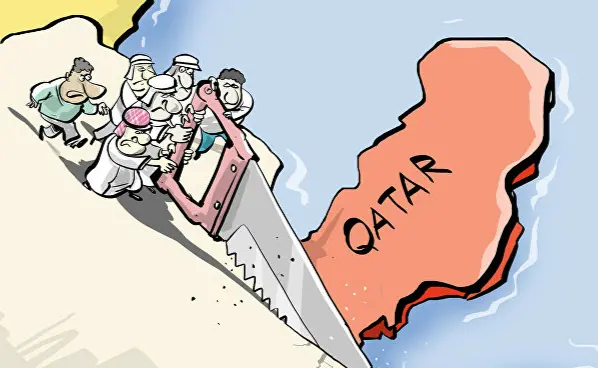By APD writer Wang Peng
Now Qatar is in big trouble. As media reports, as of now, a total of eight countries, namely Bahrain, Saudi Arabia, the UAE, Egypt, Yemen, Mauritius, Libya and Maldives, have announced to cut ties with Qatar, a wealthy nation that hosts the largest American military facility in the Gulf region.
There are many potential reasons and contending deductions about this dramatic change in the geopolitics of the Middle East.
According to the official statements of Bahrain and Saudi Arabia, the major accusation against Qatar includes its intervention of the domestic politics of Bahrain, supporting the international terrorism (such as the Muslim Brotherhood), as well as exacerbating the regional security tensions.
However, the underlying reasons are more complex than the denunciation on the table. As many analysts said the most likely reason is the Qatar’s policies aiming to promote its regional strategic influence and its role as the mediator amongst contradictory factions in the Gulf region angered Riyadh, which viewed Doha’s sitting-on-the-fence behaviours not only as an unacceptable betrayal but also a huge threat to Saudi Arab’s regional domination.
This piece of sad news reminds the author an old story occurred in ancient China 2,000 years ago.
The Duke Xiang of Song State in the Spring and Autumn Period, the leader of a weak, small state that was surrounded by powerful and aggressive neighbours, was determined to achieve great ambition to become the next generation of hegemony and continue to write the legend of Duke Huan of Qi State, the first and most honourable hegemon at that time.
However, as the famous international relations expert Yan Xuetong said, any state must act properly on the basis of its national strength and power influence (or namely, its ranking in the hierarchy), rather than play a role that their strengths cannot match.
Similar assertions were also interpreted by the ancient Greeks that “the strong do what their power can do, the weak suffer what they must.”
However, it seems to be clear that the leaders of Qatar did not pay close attention to those maxims and made every effort to enlarge its regional power through an arbitrary and radical approach that beyond the tolerance of its hostile neighbours, as well as the “big boss” - America.
Sixteen years ago, John J. Mearsheimer, Professor of Political Science at Chicago University published his masterpiece The Tragedy of Great Powers that explores the sad destiny of their unavoidable conflicts.
However, what is more sorrow for small states is that they even have no chance to play the tragic role in the grand chessboard of great powers. Bearing this motto in minds may be helpful to many states that share the similar positions of Qatar.
Qatar is not alone. In other places, such as the East Asian region, who will become the next? Who will be the “small state with big ambition”, and even play a role of the trouble maker that brings out regional super powers to conduct interventions at the cost its own neighbours?
Let's wait and see.
Dr. Wang Peng, Research Fellow at Charhar Institute, Lecturer at the China Institute of Fudan University.
(ASIA PACIFIC DAILY)
 简体中文
简体中文





